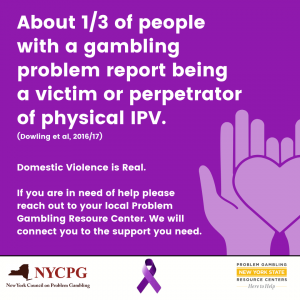Problem Gambling and Domestic Violence
Problem gambling may not be a common topic discussed during Domestic Violence Awareness Month; however, the link between domestic violence and problem gambling makes it important to bring awareness to this volatile relationship.
Domestic violence is defined as violent or aggressive behavior within the home, typically involving the violent abuse of a spouse or partner, which may include physical violence; sexual, psychological, social, or financial abuse; harassment; and stalking.
The Relationship Between Problem Gambling and Domestic Violence
Studies show that there is a relationship between domestic violence and gambling. Gambling-related stressors, such as financial losses and relationship conflicts or neglect, can impact the family and lead to escalating violence.
As always, the more we know about something, the better prepared we can be to address the situation. It is important to know the facts about gambling, domestic violence and intimate partner violence:
- One-third of problem gamblers report being the victim or perpetrator of physical intimate partner violence.
- Problem gambling often precedes intimate partner violence.
- Emerging studies show problem gambling as a risk factor for intimate partner violence.
- Victims of intimate partner violence may use gambling as a form of escape or a coping mechanism, which could then turn into problematic gambling behavior.
- Intimate partner violence can occur due to stressors brought about by gambling behavior.
- When a person’s partner was addicted to gambling, the odds of intimate partner violence increased 10.5 times.
- Problem gambling and intimate partner violence instances are underreported due to stigma and lack of screening.

What The Research Shows
A recent study of help-seeking gamblers found that forty-nine percent of participants reported being a victim of violence and 43% had perpetrated violence (Bellringer et al., 2017). A person with a gambling problem may experience intense mental and emotional distress which may be expressed through restlessness, irritability, or violence. Someone’s gambling problem may also elicit similar distress from a loved one. The person gambling may be the perpetrator or victim of domestic violence.
Furthermore, there is already evidence that domestic violence increases during professional sporting events due to the emotions experienced from a “home team’s” upset loss, citing issues like consumption of alcohol, increased interactions with family members during games, increased expectations for a positive outcome, and increased stress and anxiety. Our community, the state and the country are seeing increased availability and prevalence of sports gambling, daily fantasy sports, and the like. What happens when those high stakes are further intensified by having large sums of money on the line, potentially for multiple sporting events?
Warning Signs
Problem gambling and domestic violence can impact anyone. One way we can educate ourselves and look out for our loved ones and communities is to know the warning signs of problem gambling:
- Constant thoughts of gambling
- Borrowing money
- Irritability, restlessness, withdrawal
- Delay payment of bills
- Neglecting household duties
- Decline in personal hygiene
- Decline in health or hygiene
- Alienation from family and friends
- Inability to cut back / stop gambling
- Extreme guilt or shame
- Disappear for long periods of time
- Suicidal thoughts
Help Available
In many ways, this October is unlike any in the past, but some things remain constant – there are many people who will isolate themselves out of fear or shame and will not reach out for the help they need. Domestic Violence Awareness Month gives us an opportunity to offer hope to those experiencing violence in the home.
If you are experiencing domestic violence or problem gambling, confidential services are available:
NYS Problem Gambling Resource Centers
National Domestic Violence Hotline: 1-800-799-7233
Additional Resources:
National Coalition Against Domestic Violence
